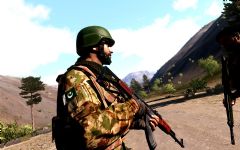Human Rights Voices
While the UN devotes its human rights operations to the demonization of the democratic state of Israel above all others and condemns the United States more often than the vast majority of non-democracies around the world, the voices of real victims around the world must be heard.
Pakistan, October 25, 2018
U.S., EU nations express ‘serious concerns’ about Pakistan’s aid group crackdown
Original source
Western nations, including the United States and European countries, have expressed "serious concerns" to Pakistan's new Prime Minister Imran Khan about a crackdown on aid groups, diplomats said.
Pakistan has long viewed foreign-funded aid groups with suspicion and many members of the powerful military believe that Western countries often use such groups as a cover for spying.
Diplomats and foreign journalists also face severe restrictions on their movements in the nuclear-armed nation.
At least 18 international aid agencies, most of them working on human rights issues, were ordered to leave Pakistan over recent months after being refused registration.
The countries have written a letter to Khan saying the groups did not get a proper explanation for why the government had ordered them out and they criticized a "lack of transparency" in the registration process.
"We are writing to express serious concerns with respect to recent developments," the countries said in the letter seen by Reuters. Four diplomats confirmed its authenticity.
"Restriction on civil society risks affecting Pakistan's international reputation as a genuine partner on human developments and undermining confidence of the international donor and business community," they said in the letter.
Neither Khan's office nor the foreign ministry had any immediate comment on the letter, which was signed by envoys from the United States, Canada, Japan, Australia, Norway and Switzerland.
The European Union ambassador signed on behalf of the 17 EU countries with missions in Pakistan, including Britain and France.
A similar letter was sent to the Interior Ministry in September, diplomatic sources say.
The 18 aid organizations were appealing against their expulsion orders, issued late last year to 27 non-governmental organizations (NGOs) in all.
The Western envoys said the impact of expelling the groups would be "significant", and warned that it would imperil some of development goals championed by Khan, who was elected in July on a populist platform to help the poor.
"Restricting INGO operations will affect millions of poor Pakistanis. In 2017 alone, the INGO sector reached 34 million people with humanitarian relief and development assistance," the counties aid in their letter, referring to international NGOs.
"This will mean thousands of Pakistanis employed by INGOs and local partners may lose their jobs."
One of the 18 groups facing closure, ActionAid, which focuses on education, poverty alleviation and human rights, said this month the expulsion of the groups was part of a broader pattern.
"Pakistan's decision to shut down ActionAid and other International NGOs is a worrying escalation of recent attacks on civil society, academics and journalists," the group said.
Media groups have warned of a more difficult environment for them with increasing censorship and threats from the military, which denies intimidation.

